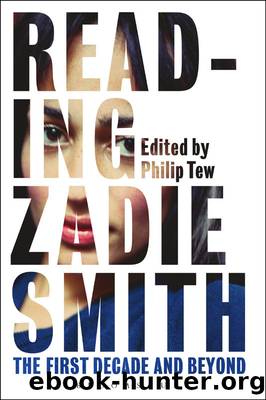Reading Zadie Smith by -

Author:-
Language: eng
Format: azw3
ISBN: 9781472517159
Publisher: Bloomsbury Publishing
Published: 2013-12-04T16:00:00+00:00
The seemingly casual encounter and brief exchange is still replete with underlying meaning and narrative purpose, demonstrating an on-going feature of Smithâs writing that Philip Tew notes in Zadie Smith (2009) as follows: âSmithâs technique of overlaying and multiplying view-points, often refracted by others, is highly effective, adding depth to her perspectivesâ (102). The distinction between the public and private registers runs through the passage above, demonstrating the often suppressed conflict between the two, a seemingly social demand that one acts or speaks as the group does which is undercut by inner, mostly private views and desires, one antithetical to the other.
While all three main characters are products of the same marginalized racial and socioeconomic environment, they each exhibit distinctive responses to the circumstances in which they were brought up (with only the two women being âborn and bredâ). The only white character of the three, Leah displays the least interest in rising above her upbringing, settling for a middling education and a low-paying job in a local social agency. Unlike her African-born husband Michel, a hairdresser who tries to better their lot through on-line trading, Leah prefers a life of indolence, smoking dope with her neighbours and wishing to remain âeighteen alwaysâ (22) in her mind. In a sense, Leah occupies the stereotypical position of ambitionless under-achievement often assigned by mainstream British culture to immigrant and non-white Londoners. On the other hand, Natalie, who changes her name from Keisha to distance herself from her impoverished black heritage, is relentlessly ambitious, willing to reject her family and her religion to pursue a legal career; as a young woman, she âthought life was a problem that could be solved by means of professionalizationâ (177). After leaving her Christian boyfriend Rodney for the more financially successful Frank De Angelis, an investment banker, Natalie becomes âcrazy busy with self-inventionâ (183), fabricating a white middle-class lifestyle that Leah finds hypocritical, thinking of Natalie as a âcoconutâ (55) who is black only on the outside. Natalie lives âjust far enoughâ from the council estate (housing project) âto avoid itâ, while Leah âcan see it from her backyardâ (55).
Between these two extremes lies Felix, an incomer to Caldwell in childhood, the son of a Rastafarian father and an absent schizophrenic mother, who began life as a stereotypical lower-class black male, directionless and in trouble with the law. After completing a General National Vocational Qualification in catering, he bounced around to a number of low-paying jobs, including various ill-conceived ventures with his father Lloyd, before doing gopher jobs for the film industry and becoming a drug-dealer and addict. Having had two children when he was young, Felix rarely sees them, unable to cope with their mother Jasmine, âan oppositional womanâ (112). The reinvented Felix, an aficionado of self-help books and motivational slogans, has cleaned himself up, determined to turn his life around, and is working relatively steadily as a mechanic. In keeping with his name, he claims ironically (given his fate) to have âalways been luckyâ (110),
Download
This site does not store any files on its server. We only index and link to content provided by other sites. Please contact the content providers to delete copyright contents if any and email us, we'll remove relevant links or contents immediately.
The Power of Myth by Joseph Campbell & Bill Moyers(1065)
Half Moon Bay by Jonathan Kellerman & Jesse Kellerman(987)
A Social History of the Media by Peter Burke & Peter Burke(985)
Inseparable by Emma Donoghue(983)
The Nets of Modernism: Henry James, Virginia Woolf, James Joyce, and Sigmund Freud by Maud Ellmann(911)
The Spike by Mark Humphries;(811)
The Complete Correspondence 1928-1940 by Theodor W. Adorno & Walter Benjamin(787)
A Theory of Narrative Drawing by Simon Grennan(778)
Culture by Terry Eagleton(775)
Ideology by Eagleton Terry;(741)
World Philology by(719)
Farnsworth's Classical English Rhetoric by Ward Farnsworth(715)
Game of Thrones and Philosophy by William Irwin(712)
Bodies from the Library 3 by Tony Medawar(709)
High Albania by M. Edith Durham(704)
Adam Smith by Jonathan Conlin(693)
A Reader’s Companion to J. D. Salinger’s The Catcher in the Rye by Peter Beidler(688)
Comic Genius: Portraits of Funny People by(652)
Monkey King by Wu Cheng'en(651)
